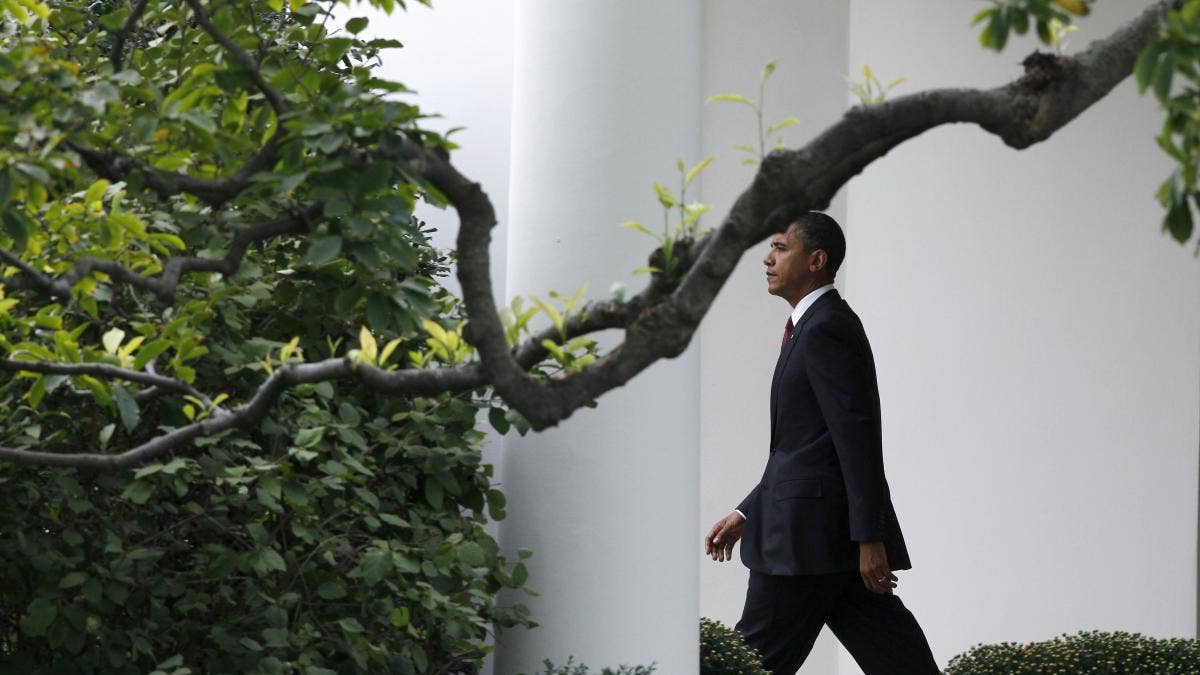
President Barack Obama walks towards the South Lawn of the White House in Washington, Wednesday, Oct. 6, 2010, to board Marine One helicopter as he travels to Newark, N.J. (AP Photo/Charles Dharapak)
Democrats around the country are running ads with an unusual message -- don't blame me for the policies of the Obama Administration.
A television ad from Virginia Democrat Glenn Nye, who's running for reelection to the U.S. House, has an announcer explaining that "sometimes the right path is not always the easy path," going on to document the many times Nye voted against the Democratic agenda - including healthcare.
And longtime Texas Democrat Chet Edwards, also up for reelection to the House, ran an ad in which the announcer intones, "When President Obama and Nancy Pelosi pressured Chet Edwards, Chet stood up to them and voted no against their trillion dollar health care bill, and no to Cap and Trade."
Alabama Congressman Bobby Bright has an ad quoting constituents. A young blonde woman says, "He stands up to Nancy Pelosi." A man in a business suit says, "Bobby Bright opposed the bailouts." And another woman says, "Bobby Bright voted against the healthcare bill, and he'll repeal what's wrong with it."
These Democrats are stressing their independence for good reason. Obama Administration policies are unpopular in many places, and Democratic candidates don't want to be the fall guy.
Political analyst Stuart Rothenberg notes that "voters tend to see midterm elections as referenda on the party in power when one party controls everything the way the Democrats do."
President Obama, of course, has been out on the campaign trail trying to excite voters. While his efforts may increase turnout, they also put the focus on him and his policies. And Rothenberg thinks that could draw more attention to negative policies. "There are going to be independents, swing voters, who are going to be reminded this election is about President Obama."
So Democratic strategist Joe Trippi and other strategists are advising Democrats to run against their individual opponent and "localize" the election rather than defending the administration or the Democratic leadership.
"I think it would be a mistake to try to make it a national election," Trippi says."I think that makes it more of a referendum on Obama and the Democratic majority."
Larry Sabato of the University of Virginia Center for Politics agrees, and says a lot of candidates are already listening. "In a lot of states and districts, the Democratic nominees are saying 'we understand you're unhappy about President Obama, we understand you're unhappy about the economy. If only you had a good Republican to vote for, but you don't. Your republican is corrupt; your republican is involved in scandal and bankruptcy and hasn't paid his taxes.'"
And Rothenberg finishes the pitch for Democrats: "They say: 'This is not about healthcare reform or Barack Obama or Nancy Pelosi. This is about two candidates who are running; it's about the incumbent versus the Republican challenger.'"
Case in point, the latest Fox news/Pulse Opinion dynamics poll shows that in West Virginia 55 percent of likely voters say the policies of the Obama administration have hurt the state's economy, and 60 percent say their vote in the Senate race will be aimed at expressing their opposition to those policies.
That means Joe Manchin, the Democratic governor running for Senate, who happens to oppose many of Mr Obama's policies, will have to bear the burden of them anyway.




